STOREP 2020: Invited speakers
[:en]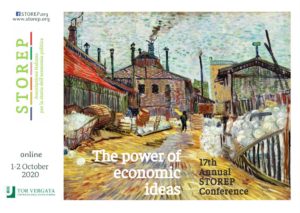
17th STOREP CONFERENCE
Online (Univ. di Roma Tor Vergata), 1-2 October 2020
“The Power of Economic Ideas”
* * *
ΙΙ Home ΙΙ Raffaelli Lecture ΙΙ Young Scholars ΙΙ
* * *
 STOREP 2020 invited speaker Professor AMOS WITZTUM received his MA from the Hebrew University of Jerusalem and his PhD in economics from the London School of Economics. He has taught, among others, at the Hebrew University, the London School of Economics, Universite Libre de Bruxelles, Sorbonne, Singapore Institute of Management, Moscow State University and London Metropolitan University. He is currently a Research Associate at the Centre for the Philosophy of the Natural and Social Sciences at the LSE. Professor Witztum was involved in the founding of three academic institutions: The New Economic School and the International College of Economics and Finance in Moscow and the International School of Economics in Almaty. In the latter two institutions he has contributed to the development of a new approach towards the curriculum of economic education representing an attempt at contextualising economics. He had also been a Chief Examiner in the University of London International Programmes where he contributed to such contextualisation through curriculum developments.
STOREP 2020 invited speaker Professor AMOS WITZTUM received his MA from the Hebrew University of Jerusalem and his PhD in economics from the London School of Economics. He has taught, among others, at the Hebrew University, the London School of Economics, Universite Libre de Bruxelles, Sorbonne, Singapore Institute of Management, Moscow State University and London Metropolitan University. He is currently a Research Associate at the Centre for the Philosophy of the Natural and Social Sciences at the LSE. Professor Witztum was involved in the founding of three academic institutions: The New Economic School and the International College of Economics and Finance in Moscow and the International School of Economics in Almaty. In the latter two institutions he has contributed to the development of a new approach towards the curriculum of economic education representing an attempt at contextualising economics. He had also been a Chief Examiner in the University of London International Programmes where he contributed to such contextualisation through curriculum developments.
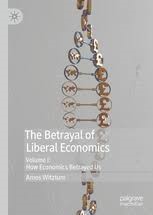
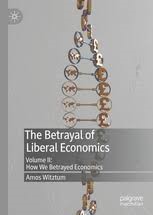 Professor Witztum’s research interests are broadly focused on the relationship between ethics, economics and society. Through the study of both current issues and the history of economic analysis, he has been trying to explore further the relationship between the individual and society (and its institutions). Particular focus has been given to how social dispositions and ethical values—endogenously created— affect our understanding of the nature of the economic system, the purpose of exchange, forms of economic organisation, the role of government and the way in which we evaluate economic and social outcomes. He is the author of The Betrayal of Liberal Economics (vols I & II) published by Palgrave-Macmillan in June 2019 which, to an extent, is a culmination of his research agenda. He is currently working on the third volume which is dealing with the social and political consequences of the critique of economics in the first two volumes. Throughout his academic career he has published numerous articles in journals and books as well as edited conference proceedings. He had also been an editor and the book review editor of Economica. He has been active in the European Society for the History of Economic Thought (ESHET) where he served as the secretary as well as in the Guggenheim Programme for the History of Economics.
Professor Witztum’s research interests are broadly focused on the relationship between ethics, economics and society. Through the study of both current issues and the history of economic analysis, he has been trying to explore further the relationship between the individual and society (and its institutions). Particular focus has been given to how social dispositions and ethical values—endogenously created— affect our understanding of the nature of the economic system, the purpose of exchange, forms of economic organisation, the role of government and the way in which we evaluate economic and social outcomes. He is the author of The Betrayal of Liberal Economics (vols I & II) published by Palgrave-Macmillan in June 2019 which, to an extent, is a culmination of his research agenda. He is currently working on the third volume which is dealing with the social and political consequences of the critique of economics in the first two volumes. Throughout his academic career he has published numerous articles in journals and books as well as edited conference proceedings. He had also been an editor and the book review editor of Economica. He has been active in the European Society for the History of Economic Thought (ESHET) where he served as the secretary as well as in the Guggenheim Programme for the History of Economics.
The title of his talk at the forthcoming STOREP Conference is: A powerful Misguided Idea: Natural order through the prism of values and prices.
Joint INET-STOREP initiative: “Alternative perspectives on aggregate investments and capital accumulation”
Speakers:
Anwar Shaikh, New School for Social Research, NYC
Fabio Petri, Università di Siena
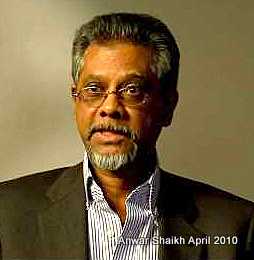
Anwar Shaikh is Professor of Economics at the Graduate Faculty of Political and Social Science of the New School University, Associate Editor of the Cambridge Journal of Economics, from 2000-2005 Senior Scholar and member of the Macro Modeling Team at the Levy Economics Institute of Bard College. His most recent book is Capitalism: Competition, Conflict, Crises from Oxford University Press 2016, his intellectual biography is included in the book Eminent Economists II from Cambridge University Press 2014, and in 2013 he was awarded the Social Science Prize of the NordSud International Prize for Literature and Science of the Fondazione Pescarabruzzo in Italy for his paper on George Soros’ notion of reflexivity entitled “Reflexivity, Path-Dependence and Disequilibrium Dynamics” in the Journal of Post Keynesian Economics, Fall 2010.
He was the recipient of two successive grants from the Institute for New Economic Thinking (INET) in 2011-2012. A prior book was Globalization and the Myths of Free Trade (2007, Routledge). He has written on international trade, finance theory, political economy, macroeconomic policy, the welfare state, growth theory, inflation theory, crisis theory, national and global inequality, and past and current global economic crises. Some recent articles are “Income Distribution, Econophysics and Piketty”, Review of Political Economy, 2016, 18-29 July; “Race, gender and the econophysics of income distribution in the USA”, with Nikolaos Papanikolaou and Noe Wiener, Physica A 415 (2014) 54–60; “On the role of reflexivity in economic analysis”, Journal of Economic Methodology (2014), 439-445; and “The First Great Depression of the 21st Century”, Socialist Register, 2011, Fall.
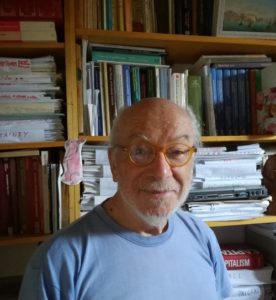
Fabio Petri. Born 1949 in Naples. Master in Political Science with dissertation on capital theory, 1972. CNR researcher at University of Siena, 1974. Then studies at Trinity College, Cambridge, 1975-78. In 1978 becomes lecturer in Introductory Economics in Siena, then associate professor, then full professor, always in Siena, where he teaches up to retirement in 2014, continuing afterwards to teach critical micro and macro in the PhD program. Gives seminars in Cambridge, London, Bielefeld, Harvard, Paris Nanterre, Tokio, Graz, Sydney. Twice co-ordinates research groups on growth and distribution. An admirer of Pierangelo Garegnani, cooperates with him to writing the chapter “Marxism and economic theory to-day” in Storia del Marxismo Einaudi, vol. 4 (1980), and edits the posthumous publication of an essay by Garegnani on Marx. His contributions are on capital theory, investment, Say’s Law, general equilibrium theory, Marx. His book General Equilibrium, Capital and Macroeconomics (2004) importantly contributes to dispelling widespread confusions on the difference between long-period and neo-Walrasian general equilibria and the relevance of the Cambridge controversies. Is the author of the entry “Capital Theory” in Faccarello-Kurz’s Handbook on the History of Economic Analysis (2016). In recent years has dedicated most of his time to preparing a textbook on advanced microeconomics, which is now with the printers. A large part of his writings is available from his web page fabiopetripapers. [:it]

17th STOREP CONFERENCE
Online (Univ. di Roma Tor Vergata), 1-2 October 2020
“The Power of Economic Ideas”
* * *
ΙΙ Home ΙΙ Raffaelli Lecture ΙΙ Young Scholars ΙΙ
* * *
 STOREP 2020 invited speaker Professor AMOS WITZTUM received his MA from the Hebrew University of Jerusalem and his PhD in economics from the London School of Economics. He has taught, among others, at the Hebrew University, the London School of Economics, Universite Libre de Bruxelles, Sorbonne, Singapore Institute of Management, Moscow State University and London Metropolitan University. He is currently a Research Associate at the Centre for the Philosophy of the Natural and Social Sciences at the LSE. Professor Witztum was involved in the founding of three academic institutions: The New Economic School and the International College of Economics and Finance in Moscow and the International School of Economics in Almaty. In the latter two institutions he has contributed to the development of a new approach towards the curriculum of economic education representing an attempt at contextualising economics. He had also been a Chief Examiner in the University of London International Programmes where he contributed to such contextualisation through curriculum developments.
STOREP 2020 invited speaker Professor AMOS WITZTUM received his MA from the Hebrew University of Jerusalem and his PhD in economics from the London School of Economics. He has taught, among others, at the Hebrew University, the London School of Economics, Universite Libre de Bruxelles, Sorbonne, Singapore Institute of Management, Moscow State University and London Metropolitan University. He is currently a Research Associate at the Centre for the Philosophy of the Natural and Social Sciences at the LSE. Professor Witztum was involved in the founding of three academic institutions: The New Economic School and the International College of Economics and Finance in Moscow and the International School of Economics in Almaty. In the latter two institutions he has contributed to the development of a new approach towards the curriculum of economic education representing an attempt at contextualising economics. He had also been a Chief Examiner in the University of London International Programmes where he contributed to such contextualisation through curriculum developments.

 Professor Witztum’s research interests are broadly focused on the relationship between ethics, economics and society. Through the study of both current issues and the history of economic analysis, he has been trying to explore further the relationship between the individual and society (and its institutions). Particular focus has been given to how social dispositions and ethical values—endogenously created— affect our understanding of the nature of the economic system, the purpose of exchange, forms of economic organisation, the role of government and the way in which we evaluate economic and social outcomes. He is the author of The Betrayal of Liberal Economics (vols I & II) published by Palgrave-Macmillan in June 2019 which, to an extent, is a culmination of his research agenda. He is currently working on the third volume which is dealing with the social and political consequences of the critique of economics in the first two volumes. Throughout his academic career he has published numerous articles in journals and books as well as edited conference proceedings. He had also been an editor and the book review editor of Economica. He has been active in the European Society for the History of Economic Thought (ESHET) where he served as the secretary as well as in the Guggenheim Programme for the History of Economics.
Professor Witztum’s research interests are broadly focused on the relationship between ethics, economics and society. Through the study of both current issues and the history of economic analysis, he has been trying to explore further the relationship between the individual and society (and its institutions). Particular focus has been given to how social dispositions and ethical values—endogenously created— affect our understanding of the nature of the economic system, the purpose of exchange, forms of economic organisation, the role of government and the way in which we evaluate economic and social outcomes. He is the author of The Betrayal of Liberal Economics (vols I & II) published by Palgrave-Macmillan in June 2019 which, to an extent, is a culmination of his research agenda. He is currently working on the third volume which is dealing with the social and political consequences of the critique of economics in the first two volumes. Throughout his academic career he has published numerous articles in journals and books as well as edited conference proceedings. He had also been an editor and the book review editor of Economica. He has been active in the European Society for the History of Economic Thought (ESHET) where he served as the secretary as well as in the Guggenheim Programme for the History of Economics.
The title of his talk at the forthcoming STOREP Conference is: A powerful Misguided Idea: Natural order through the prism of values and prices.
Joint INET-STOREP initiative: “Alternative perspectives on aggregate investments and capital accumulation”
Speakers:
Anwar Shaikh, New School for Social Research, NYC
Fabio Petri, Università di Siena

Anwar Shaikh is Professor of Economics at the Graduate Faculty of Political and Social Science of the New School University, Associate Editor of the Cambridge Journal of Economics, from 2000-2005 Senior Scholar and member of the Macro Modeling Team at the Levy Economics Institute of Bard College. His most recent book is Capitalism: Competition, Conflict, Crises from Oxford University Press 2016, his intellectual biography is included in the book Eminent Economists II from Cambridge University Press 2014, and in 2013 he was awarded the Social Science Prize of the NordSud International Prize for Literature and Science of the Fondazione Pescarabruzzo in Italy for his paper on George Soros’ notion of reflexivity entitled “Reflexivity, Path-Dependence and Disequilibrium Dynamics” in the Journal of Post Keynesian Economics, Fall 2010.
He was the recipient of two successive grants from the Institute for New Economic Thinking (INET) in 2011-2012. A prior book was Globalization and the Myths of Free Trade (2007, Routledge). He has written on international trade, finance theory, political economy, macroeconomic policy, the welfare state, growth theory, inflation theory, crisis theory, national and global inequality, and past and current global economic crises. Some recent articles are “Income Distribution, Econophysics and Piketty”, Review of Political Economy, 2016, 18-29 July; “Race, gender and the econophysics of income distribution in the USA”, with Nikolaos Papanikolaou and Noe Wiener, Physica A 415 (2014) 54–60; “On the role of reflexivity in economic analysis”, Journal of Economic Methodology (2014), 439-445; and “The First Great Depression of the 21st Century”, Socialist Register, 2011, Fall.

Fabio Petri. Born 1949 in Naples. Master in Political Science with dissertation on capital theory, 1972. CNR researcher at University of Siena, 1974. Then studies at Trinity College, Cambridge, 1975-78. In 1978 becomes lecturer in Introductory Economics in Siena, then associate professor, then full professor, always in Siena, where he teaches up to retirement in 2014, continuing afterwards to teach critical micro and macro in the PhD program. Gives seminars in Cambridge, London, Bielefeld, Harvard, Paris Nanterre, Tokio, Graz, Sydney. Twice co-ordinates research groups on growth and distribution. An admirer of Pierangelo Garegnani, cooperates with him to writing the chapter “Marxism and economic theory to-day” in Storia del Marxismo Einaudi, vol. 4 (1980), and edits the posthumous publication of an essay by Garegnani on Marx. His contributions are on capital theory, investment, Say’s Law, general equilibrium theory, Marx. His book General Equilibrium, Capital and Macroeconomics (2004) importantly contributes to dispelling widespread confusions on the difference between long-period and neo-Walrasian general equilibria and the relevance of the Cambridge controversies. Is the author of the entry “Capital Theory” in Faccarello-Kurz’s Handbook on the History of Economic Analysis (2016). In recent years has dedicated most of his time to preparing a textbook on advanced microeconomics, which is now with the printers. A large part of his writings is available from his web page fabiopetripapers. [:]
